Overview
The article "5 Steps to Start Your Wine Company Successfully" serves as a comprehensive guide for entrepreneurs aiming to establish a successful wine business. It underscores the necessity of:
- Defining a robust business model
- Conducting thorough market research
- Navigating legal requirements
- Crafting a compelling brand
- Establishing effective production and sales channels
Each of these elements is vital for positioning a wine company for sustainable growth and resilience in a competitive market. By following these essential steps, aspiring wine entrepreneurs can confidently embark on their journey, equipped with the insights needed to thrive in this dynamic industry.
Introduction
Starting a wine company presents an enticing fusion of creativity and commerce, yet the complexities of this industry can be overwhelming. With a rapidly growing market that increasingly favors unique, sustainable offerings, aspiring entrepreneurs have a remarkable opportunity to carve out their niche. However, the journey to success is not without its challenges; it requires defining a compelling business model and mastering the intricacies of licensing and market demands.
What essential steps must be taken to transform a passion for wine into a thriving business?
Define Your Wine Business Model
Defining your beverage business model begins with understanding and selecting the type of venture you wish to pursue. Choices include:
- Creating a vineyard
- Managing a winery
- Operating a beverage shop
- Exploring how to start a wine company
Each model presents , with data indicating a surge in online beverage sales, reflecting a . Next, in learning how to start a wine company, identify your target audience—be it local buyers, tourists, or a broader online market—this will shape your marketing strategies and product offerings.
Evaluate your (USP) to distinguish your product from competitors. This may involve:
- Organic production techniques
- Unique varietals
- A
For instance, brands focusing on , such as those producing organic and biodynamic beverages, have successfully attracted environmentally conscious customers.
When considering how to start a wine company, outline your , which may encompass:
- Beverage sales
- Club memberships
- Events
- Merchandise
A well-organized commercial model should distinctly record these components, serving as a guide for your operations and marketing strategies. Accomplished vineyard proprietors often emphasize the importance of of the beverage market, underscoring that a robust operational framework is essential for sustained success. By understanding these key components, you can discover how to start a wine company that is positioned for growth and resilience in an evolving industry.
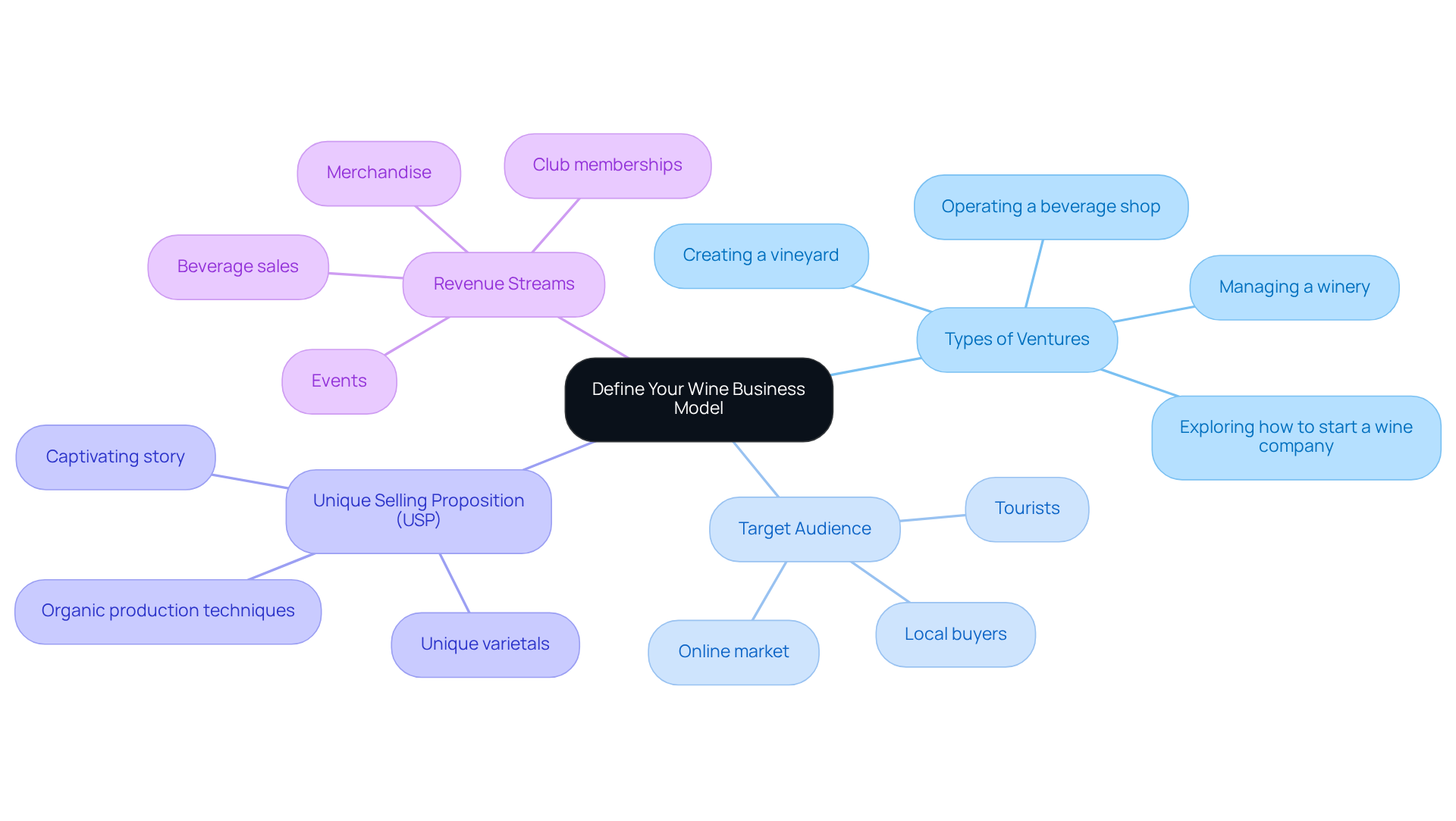
Conduct Market Research and Develop a Business Plan
To successfully establish your beverage business, it is imperative to commence with a comprehensive , buyer behavior, and competitor offerings. By analyzing data from surveys, focus groups, and online platforms, you can gain and purchasing habits. Notably, the beverage market is undergoing a significant transformation, with and prioritizing health-conscious choices, including low-alcohol and alcohol-free options. Identifying gaps in the market that your wine venture can address is crucial for learning , especially as the demand for .
Once sufficient data has been gathered, it is essential to create a thorough , encompassing your model, marketing strategies, financial forecasts, and operational plans. This document will serve as a and is often vital when seeking funding or partnerships. Industry analysts assert that a well-structured business plan not only clarifies your vision but also enhances your credibility with potential investors. By leveraging insights from market analysis and employing narrative techniques, you can formulate a strategy that resonates with evolving customer preferences and positions your business for long-term success. Furthermore, by incorporating specific to convert casual purchasers into loyal club members, alongside emphasizing , you can significantly .
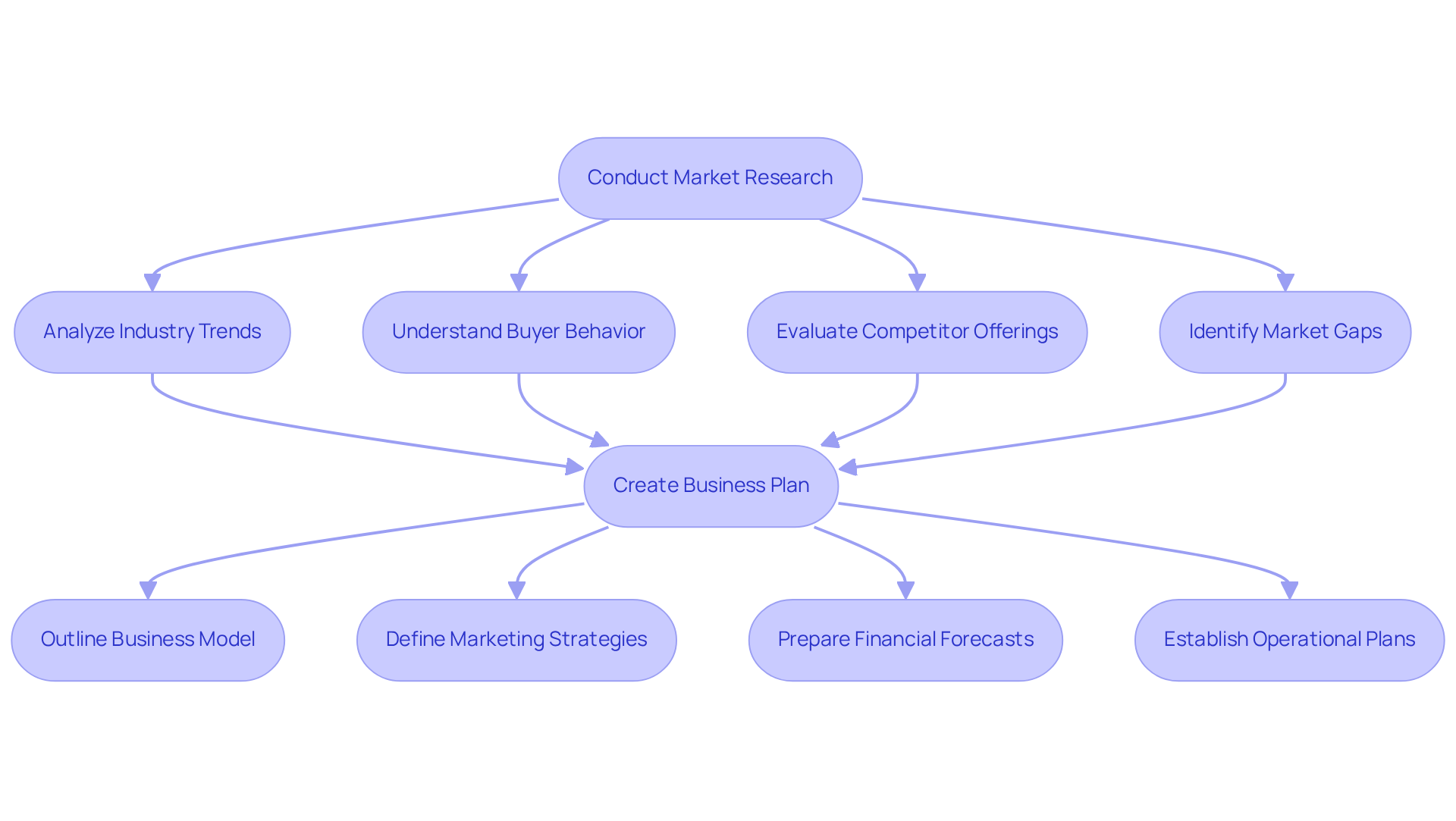
Navigate Licensing, Permits, and Financial Planning
To learn successfully, it is essential to thoroughly research the specific licenses and permits required in your region. These typically encompass federal, state, and local regulations. Key permits often include:
- Vineyard license
- Sales tax permit
- Health department permits
Engaging with legal experts or local authorities is advisable to ensure compliance with these regulations, effectively mitigating potential legal issues.
Simultaneously, developing a robust is vital. This plan should encompass:
- Startup costs
- Operational expenses
- Projected revenue
For 2025, the average can exceed $1.5 million, covering expenses such as land acquisition, equipment, and initial marketing efforts. Various are available, including personal savings, traditional loans, and investments from family or friends. can provide tailored debt, equity, and acquisition solutions to help wineries secure the necessary funding for growth. A well-organized not only assists in managing cash flow but also enables informed decision-making as your enterprise evolves.
Successful financial planning in the beverage industry underscores the importance of adapting to market conditions. For instance, vineyards that secure a can more effectively navigate seasonal fluctuations in revenue, ensuring access to funds when necessary. Furthermore, understanding the intricacies of selling beverages across state lines is crucial, as it involves .
Aspiring winery owners can learn how to start a wine company by prioritizing , establishing a solid financial foundation, and leveraging strategic capital planning along with to position themselves for long-term success in a competitive market.
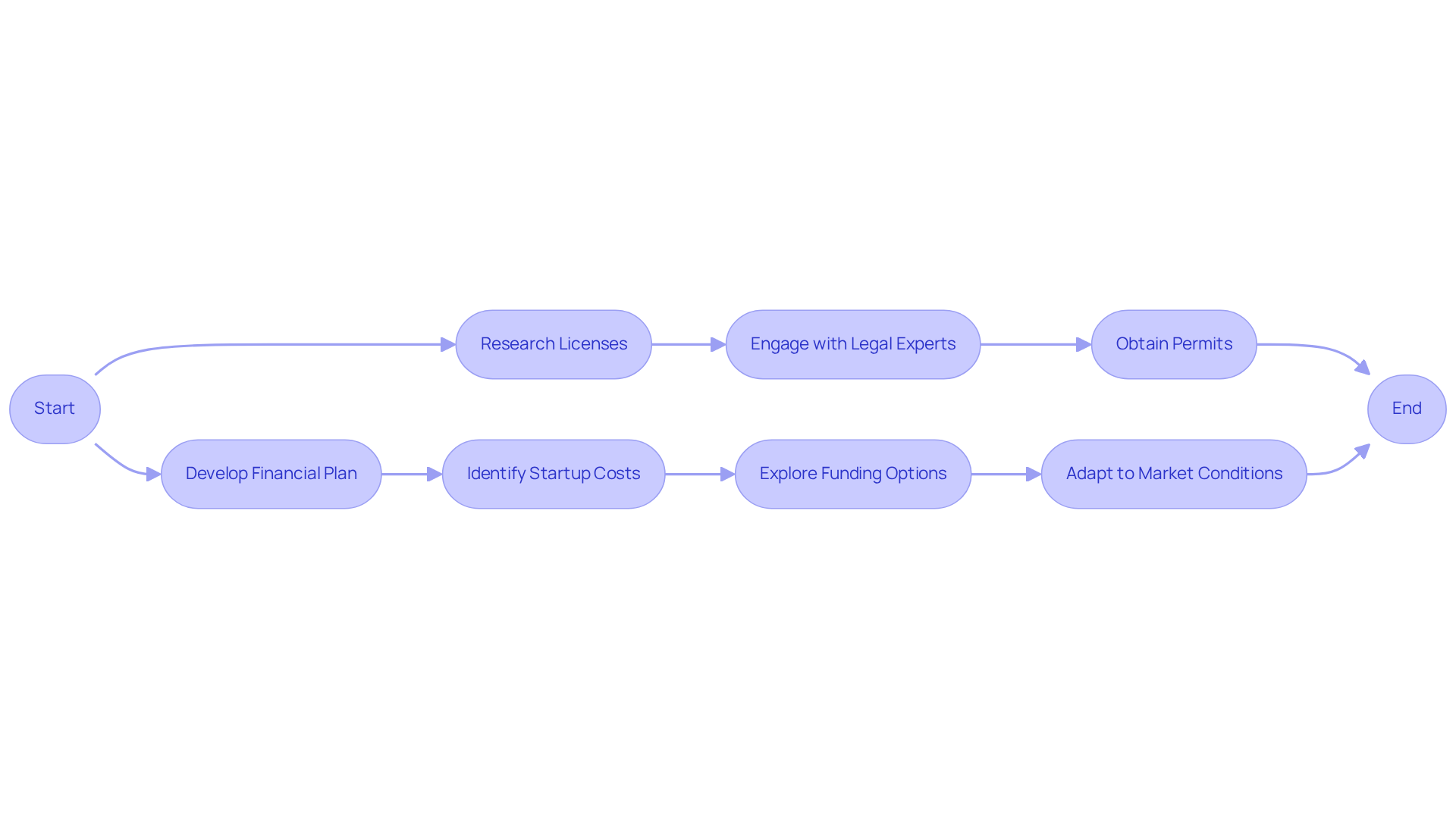
Create a Compelling Brand and Marketing Strategy
Begin by establishing a that effectively conveys the story, values, and unique traits of your beverage. A memorable logo and distinctive packaging are essential for standing out on shelves and online. Subsequently, develop a comprehensive that encompasses both online and offline tactics. Leverage social media, email marketing, and content marketing to engage potential customers. Hosting tastings, events, or forming partnerships with local businesses can significantly .
Narrative creation is crucial for forging an . Share the journey of your beverage from vineyard to bottle, highlighting the passion and craftsmanship involved. not only captivate customers but also drive sales; for instance, statistics show that 27% of club signups occur through . Wineries that actively engage their audience through storytelling and report a notable increase in repeat purchases.
Moreover, is vital for to secure suitable partners and funding opportunities, ensuring sustainable growth. A well-designed brand and marketing approach not only attracts new clients but also cultivates a loyal audience, which is essential for . Furthermore, optimizing your website for a seamless online experience and utilizing influencer marketing can further amplify your outreach and engagement.
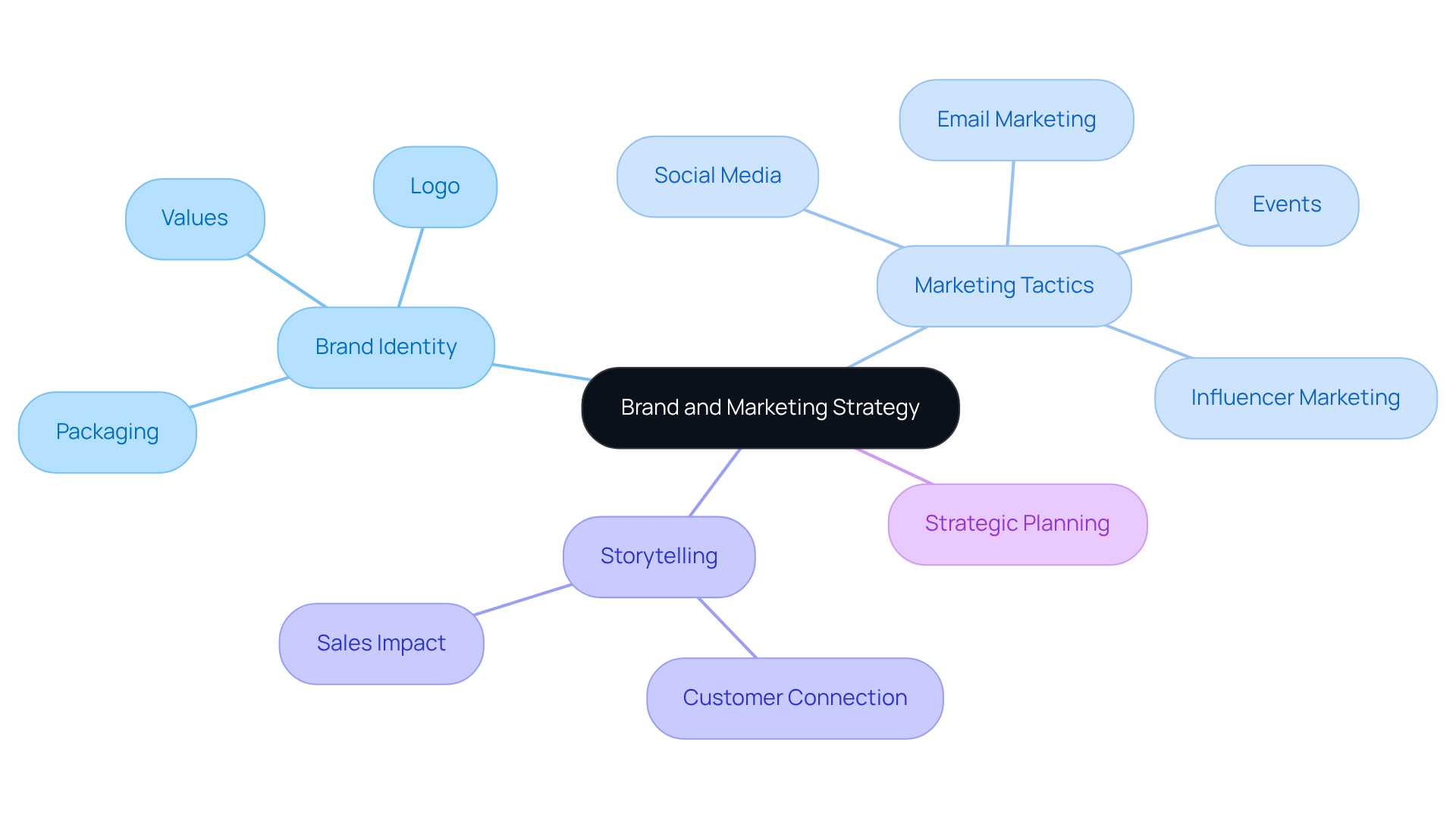
Establish Production, Distribution, and Sales Channels
Begin by evaluating your , which is essential when considering , ensuring it aligns with your business model and market demand.
Sourcing is essential for anyone looking to learn how to start a wine company; therefore, cultivate strong relationships with reliable suppliers to guarantee consistent quality.
For wineries looking to understand how to start a wine company and craft exceptional beverages, investing in is imperative, while strictly adhering to health and safety regulations.
Subsequently, formulate a that and how your product will reach consumers. This may involve:
- Direct sales through a tasting room
- Online platforms
- Partnerships with retailers and restaurants
Notably, statistics indicate that 27% of originate from digital channels, underscoring the importance of .
Ultimately, to understand how to start a wine company, you should establish that resonate with your target audience, such as:
- E-commerce platforms
- Wine clubs
- Participation in local events
By implementing these channels, you will ensure that your wine reaches consumers effectively and efficiently, ultimately driving sales and .
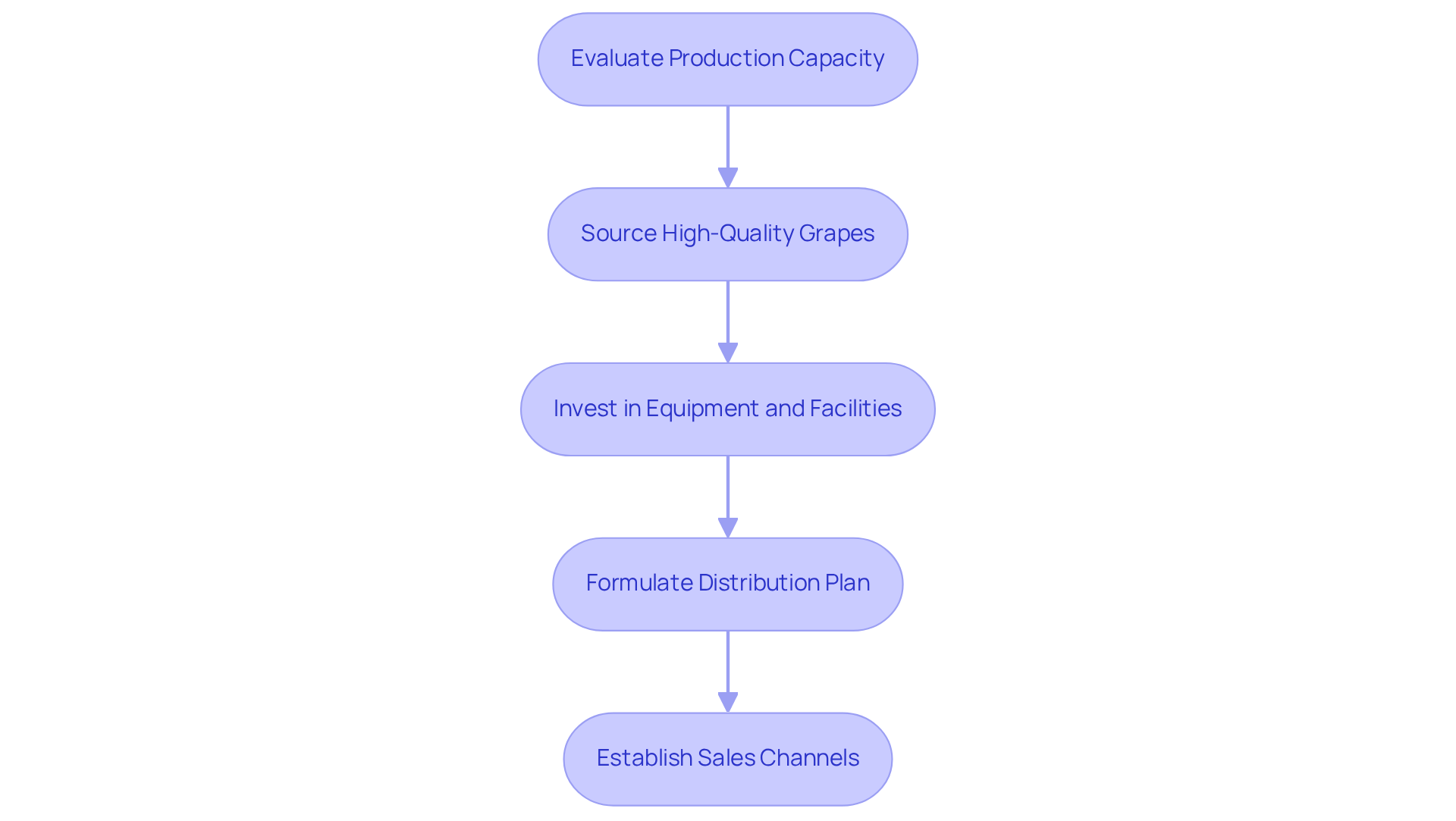
Conclusion
Starting a wine company is an intricate yet rewarding endeavor that demands meticulous planning and execution. This journey commences with the establishment of a robust business model, meticulously tailored to a specific niche within the wine industry. Whether one chooses to pursue a vineyard, winery, or retail venture, a profound understanding of the target audience and unique selling propositions is paramount for differentiation in a fiercely competitive market.
The significance of comprehensive market research and a well-structured business plan cannot be overstated; these elements serve as the bedrock for success. By analyzing industry trends and consumer preferences, aspiring entrepreneurs can unearth opportunities for innovation and sustainability. Moreover, navigating the labyrinth of necessary licensing and permits, coupled with astute financial planning, ensures compliance and strategically positions the business for growth. Establishing a compelling brand identity and a robust marketing strategy further amplifies visibility and customer engagement, while effective production and distribution channels propel sales and cultivate loyalty.
In conclusion, launching a wine company transcends mere product production; it is about crafting an experience that resonates deeply with consumers. By adhering to these strategic steps, entrepreneurs can construct a resilient business that flourishes amidst an evolving landscape. Embracing the myriad challenges and opportunities within the wine industry paves the way for a fulfilling journey, underscoring the necessity to remain adaptable and well-informed as market dynamics continually shift.
Frequently Asked Questions
What are the different business models for starting a wine company?
The different business models include creating a vineyard, managing a winery, operating a beverage shop, and exploring how to start a wine company.
How can I identify my target audience when starting a wine company?
You can identify your target audience by considering local buyers, tourists, or a broader online market, which will help shape your marketing strategies and product offerings.
What is a unique selling proposition (USP) and why is it important?
A unique selling proposition (USP) is what distinguishes your product from competitors. It is important because it can attract customers, especially if it involves elements like organic production techniques, unique varietals, or a captivating story.
What are some potential revenue streams for a wine business?
Potential revenue streams may include beverage sales, club memberships, events, and merchandise.
Why is patience and flexibility important in the beverage market?
Patience and flexibility are important because the beverage market can be complex, and a robust operational framework is essential for sustained success.
What is the significance of conducting market research when starting a wine company?
Conducting market research is significant as it helps analyze industry trends, buyer behavior, and competitor offerings, providing insights into potential customers' preferences and purchasing habits.
How has the beverage market changed in recent years?
The beverage market has transformed significantly, with younger consumers, particularly Gen Z, now comprising 45% of drinkers and prioritizing health-conscious choices, including low-alcohol and alcohol-free options.
What should be included in a business plan for a wine company?
A business plan should include your business model, marketing strategies, financial forecasts, and operational plans, serving as a roadmap for your enterprise.
How can a well-structured business plan benefit a wine company?
A well-structured business plan clarifies your vision and enhances your credibility with potential investors, making it vital when seeking funding or partnerships.
What strategies can enhance a wine company's appeal to consumers?
Strategies include leveraging market insights, converting casual purchasers into loyal club members, and emphasizing sustainability as a core value proposition.




